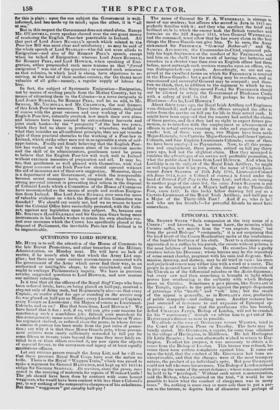QUESTIONS TO LORD HOWICK.
Mr. HUME is to call the attention of the House of Commons to the late Brevet Promotions, and other branches of the Military Administration, on Monday next. He will have no lack of matter, if be merely stick to that which the Army List sup- plies; but there are some curious circumstances connected with the government of the Army which never find their way, in an authorized or intelligible shape, to the uninitiated; and they ought to undergo Parliamentary inquiry. We have in previous articles suggested questions to Lord Howscx, and now resume our military catechism.
Is it true that all the officers of the Royal Staff Corps who have been reduced lately, have, on being placed on half-pay, received a step not only of Army rank, but Regimentally also—so that every Captain, no matter what his age or standing in the service may be, was placed on half-pay as Major; every Lieutenant as Captain; every Ensign as Lieutenant ; the Majors of course as Lieutenant- Colonels, and so on ? Has that been done, Lord Howicx? We have heard that it lies; and, if so, will you give your reasons for sanctioning such a scandalous job ; furnish your precedent for this arrangement ; name some distinguished Peninsular or Water- loo regiment shelved, or reduced since the peace, in whose favour a similar departure has been made from the just rules of promo- tion; say why it is that these Horse Guards pets, whose preemi- nent services were surely sufficiently rewarded by full pay for some fifteen o• twenty years beyond the time they were find}, en- titled to it or than others received it, are now again the objects of especial %your, to the annoyance and injury of at least equally meritorious officers.
Let any curious person consult the Army List, and he II ill see that these precious Royal Staff Corps have cost the nation no trifle. There is the Royal "Waggon Train," which was raised to make a regiment for General HAMILTON, and kept up till 1833 to oblige Sir GEORGE Scovese. Its services, since the peace, con- sisted in the carrying of materials for repairs of Windsor Castle ! The job should have been done by contract with some honest waggoner, who would have been content with less than a Colonel's pay, to say nothing of the comparative cheapness of his subalterns. But these " waggoners " get cavalry half-pay ! The name of General Sir F. A. WETHERALL is strange to most of our readers; but officers who served in Java in 1811 are perfectly familiar with it ; and they who recollect the brief and brilliant sty le in which the enemy took the British trenches and batteries on the 22d August 1811, when General WETHERALL had the command, must allow that he has every claim to the best things the Horse Guards can give him. To be sure, the Army nicknamed Sir FREDERICK "General Bother-all;" and Six SAMUEL AUCHMUTY, the Commander-in-Chief, expressed pub- licly his high displeasure at the conduct of Sir FREDERICK, and
laid him on the shelf; but the merit of having lost batteries and
trenches in a shorter time than ever an English officer lost them before, must outweigh such envious remarks upon an officer, who
was distinguished—on parade. Accordingly, we are not sur-
prised at the excellent terms on which Sir FREDERICK is received at the Horse•Guards but a good thing may be overdone, and an experienced and .successful General may be overpaid ; and there- fore we think, that, in addition to the regiment to which he was lately appointee], (the Sixty-second Foot,) Sir FREDERICK should not be allowed to retain the Government of Blackness Castle with a salary of 2S-11. 78.11d. But perhaps he has resigned Blackness—has he, Lord Howie K ?
About thirty years ago, the Royal Irish Artillery and Engineers were disbanded; and almost all the officers accepted the offer to
retire from the service on full pay for life in their actual rank. It might have been supped that the country had settled the claims of these parties, and tiltt they had no right to expect future pro- motion, or to interfere with the employment or advancement of officers in actual service, running its risks and expecting its re- wards: but, of these very men, two Majors have been made Major-Generals, two Captains Major-Generals, and three Captains Colonels, and four Captain•Lieutenants Colonels; some of them too have been employed as Paymasters. Now, to all this promo-
tion and employment, these persons, retired on full pay thirty years ago, had not the slightest claim. How they managed to combine the advantages of no service and profitable promotion, is
what the public slwu!el learn from Lord Howtcx. And when his
Lordship is on the subject of the Royal Irish Artillery, be might as well explain bow it haepens, that the name of Captain-Lieu- tenant JOHN SLESSOR of 25th July 1795, Lieutenant-Colonel 4th June 1314, tome a Colonel of course,) is found under the head of Retired PO Pay in the Army List; and that, on turning to another page of the same list, the same JOHN SLESSOR is put down as the recipient of a Major's half-pay in the Thirty-fifth Foot, since 1817. Is this lucky fellow drawing full pay as a Captain-Lieutenant of the Royal Irish Artillery, and half pay as a Major of the Thirty-fifth Foot ? And if so, who is he ? and who are his friends?—for powerful friends he must have somewhere.


























 Previous page
Previous page